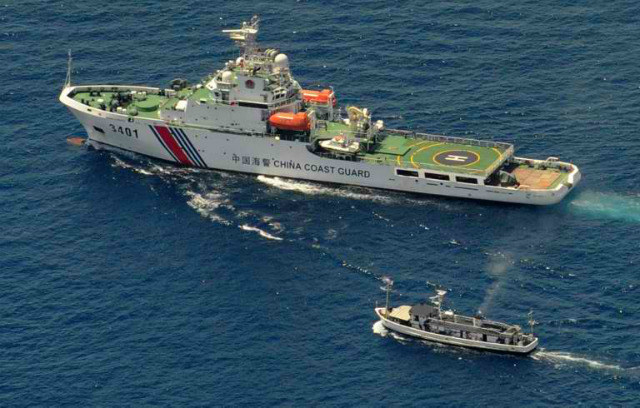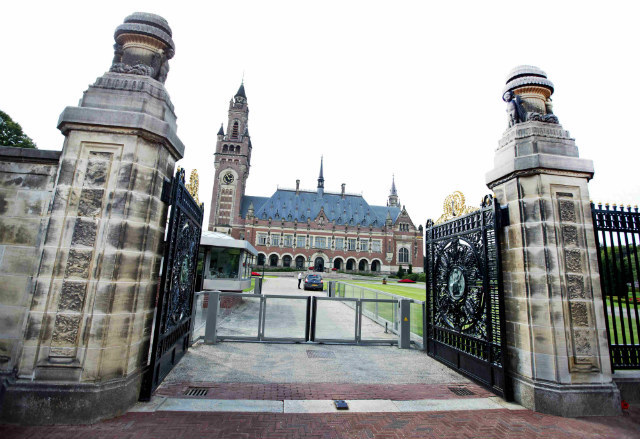On China's ancient arguments, a Supreme Court senior justice says, 'The world has rotated a trillion times, and you cannot bring this up anymore'

DAVID VS GOLIATH. A Chinese coast guard ship (top) and a Philippine supply boat engage in a standoff as the Philippine boat attempts to reach Ayungin Shoal, a reef claimed by both countries, on March 29, 2014. File photo by Jay Directo/AFP
The Philippines is set to slam China before a UN-backed tribunal Tuesday, July 7, with a practical issue at stake: the Philippines' right to fish in the disputed South China Sea.
For starters, the Philippines needs to smash China's strongest argument. China asserts that the arbitral tribunal at The Hague, The Netherlands, has no right to hear the historic case over the disputed waters. The Philippines has until Monday, July 13, to debunk China's claim.
If the court decides it has jurisdiction, Manila can present the merits of its case at a future date.
"The issue here is whether the Philippines will keep 80% of its exclusive economic zone (EEZ) in the South China Sea, or we lose it to China," Senior Associate Justice Antonio Carpio of the Philippine Supreme Court told Rappler's Maria Ressa.
"If we lose 80% of our EEZ in the South China Sea, that means we lose 80% of the fish we catch annually in the South China Sea," Carpio said in the Rappler interview on June 27.
The EEZ is an area 200 nautical miles from a coastal state's baselines or edges. Within the EEZ, the coastal state has the exclusive right to fish and to exploit other resources.
The Philippines, then, will lose much of its traditional fishing grounds if it fails before the tribunal. (Watch the full interview below.)
These traditional fishing grounds include Panatag Shoal (Scarborough Shoal) in the South China Sea or West Philippine Sea.
Panatag Shoal was the site of the site of a heated standoff between Philippine and Chinese vessels in April 2012. The incident eventually prompted the Philippines to file a historic case against China in January 2013.
Ironically, experts said the case before the Permanent Court of Arbitration at The Hague has even emboldened China.
The Asian giant, for one, has driven Filipino fishermen away from Panatag.
Calling this a human rights violation, two Filipino lawyers recently requested 3 UN bodies to "direct China...to respect the human rights" of Filipino fishermen.
Gas reserves affected, too
In his interview with Rappler, Carpio added another dimension to losing much of the EEZ: losing gas reserves.
He pointed out that the Malampaya gas field – which provides 40% of electricity in the Philippines' biggest island group, Luzon – "will run out of gas in 10 years."
Carpio said because of this, the Philippines "should develop" Recto Bank (Reed Bank) in the South China Sea, a source of natural gas bigger than Malampaya.
The problem, he said, is that the Chinese coast guard harasses Philippine survey ships in Recto Bank. (READ: Philippines slams China over 'sovereignty patrols')
This is why the Philippines is "not able to do the survey and drilling" in the area. (READ: PH gives mixed signals on Recto Bank drilling)
Carpio said the Philippines "will lose the entire Reed Bank if we lose this case to China." He added that half of Malampaya could be "encroached by the 9-dash line," China's demarcation to claim virtually the entire South China Sea.
Still, Carpio believes the Philippines has a strong case because the country adheres to United Nations Convention on the Law of the Sea (UNCLOS).

LEGAL BATTLEGROUND. A picture made available July 28, 2014, shows the seat of the Permanent Court of Arbitration at the Vredespaleis (Peace Palace), in The Hague, the Netherlands on August 27, 2013. File photo by Guus Shoonewille/EPA
"The purpose of law of the sea is to provide stability and peace in the use of our oceans and seas," Carpio said.
UNCLOS 'a big compromise'
He pointed out that before UNCLOS was concluded in 1982, coastal states claimed varying portions of the sea. Some claimed up to 500 nautical miles from the baselines, some 600, some 200.
UNCLOS provided a "big compromise," Carpio said: Each coastal state will have an EEZ of 200 nautical miles from the baselines, "but you have to waive all other historical claims to all other waters."
China has cited its historical rights to uphold its 9-dash line – which Carpio earlier said is based "on historical lies."
"China signed and ratified UNCLOS. But now China is saying, ‘Yes, we are entitled to 200 nautical miles, but we also claim the entire South China Sea because of historic rights.' I mean, they cannot do that," he said.
China reminds Carpio of the 17th century, when scholars debated whether a state can own seas and oceans. "That debate raged for over a century. There was a battle for the hearts and minds of legal scholars and policymakers."
On one hand, he said, Dutch scholar Hugo Grotius (1583-1645) argued that seas and oceans "belong to all mankind" and remain "part of the global commons."
English scholar John Selden (1584-1654), on the other hand, claimed that naval powers "could own oceans and seas."
Grotius eventually prevailed with his argument "that oceans and seas belong to all mankind, except for the territorial sea," which UNCLOS measures 12 nautical miles from a coastal state's baselines.
Carpio said: "Now, 300 years later, China is saying, 'We own the sea.' China is resurrecting the arguments of John Selden. This debate was concluded a long time ago. The world has rotated a trillion times, and you cannot bring this up anymore."

No comments:
Post a Comment
Note: Only a member of this blog may post a comment.